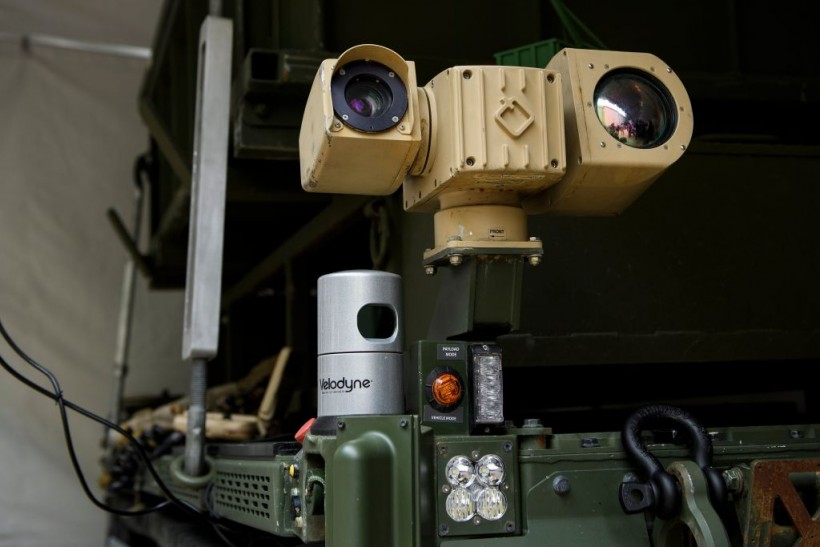Massachusetts lawmakers introduced legislation aimed at restricting the manufacture, sale, and use of weaponized robots.
This legislative action breaks from the general hostility many lawmakers have shown toward regulating robotic weapons by addressing a perceived gap in state and federal laws governing such technologies.
The legislation, introduced in mid-September, responds to concerns about "killer robots," extending beyond military applications to scenarios ranging from science fiction tales like Terminators to more grounded instances, such as the mounting of a paintball gun on a Spot robot by MSCHF.
The domestic application of robotic technology is complicated by law enforcement's prior usage of robots, such as the 2016 Dallas bomb disposal robot incident.

Sensors on the front of a US Marine robot prototype during the DOD Lab day at the Pentagon April 25, 2019, in Washington, DC.
The proposed regulation was inspired by robotics giant Boston Dynamics. Last October, the corporation and others signed an open statement opposing "general-purpose" robot weaponization.
The letter highlighted potential harm to public trust and ethical concerns associated with adding weapons to robots that are widely available to the public.
The American Civil Liberties Union (ACLU) has emphasized the significance of preventing the threat that weaponized robots pose to basic rights and safety. Instances like the sale of a flamethrower-equipped robotic dog named "The Thermonator" by Throwflame underscore the need for legislation in this domain, per Gizmodo.
Bill Not Aiming To Block Law Enforcement Innovation
The proposed legislation focuses on preventing individuals from weaponizing robots while leaving legitimate uses untouched. It does not seek to hinder law enforcement from using robots, especially in de-escalation scenarios.
However, the bill recommends that law enforcement obtain warrants for using robots in situations where they would traditionally send human officers.
While the legislation does not outright ban the weaponization of robots by law enforcement, it refrains from endorsing such practices.
Massachusetts State Representative Lindsay Sabadosa, who filed the bill alongside State Senator Michael Moore, provided insights into the current status and intentions of the legislation in a recent interview.
In a TechCrunch interview, she noted that the bill has undergone a hearing, indicating positive progress. A technical review of the language used in the bill is underway, involving collaboration with stakeholders, including companies producing robotics.
Ongoing conversations with stakeholders, including robotics companies and law enforcement agencies, have not resulted in substantial opposition to the bill.
Read Also: EU Grants Electric Vehicle Makers Extension Until 2026 to Meet Local Content Rules
Representative Sabadosa emphasizes that the bill contributes to supporting the robotics industry by providing companies with a level of safety assurance regarding their products' intended purposes.
The collaborative effort between the industry and legislators reflects a proactive stance to establish guidelines for the responsible use of robotic technologies.
"I've heard people say that we need to be careful. The roboticists are just trying to create robocops. That's not what these companies are doing.
They're trying to create robots for very specific situations that can be very useful and help save human lives. So I think that's worthy. We view this as supporting the robotics industry rather than trying to hamper it," the lawmaker remarked.
Concerns Prompt US Army Response to "Killer Robots"
The idea of integrating lethal weaponry into autonomous systems faces significant backlash globally, particularly from human rights advocates. Various robotics companies collectively urge global military entities to refrain from weaponizing their technology, emphasizing potential threats to civilian safety.
Signatories to this call assert that arming robots capable of remote or autonomous operation, widespread availability to the public, and navigation into previously inaccessible locations raises fresh risks of harm and ethical concerns.
Responding to these worldwide concerns, the US Army has introduced new regulations outlining how to address issues related to so-called "killer robots." The guidelines focus on minimizing the "probability and consequences of failures" associated with autonomous weaponry, according to The Defense Post.
Related Artricle: AI Bots Cannot Named as Inventors for Patents, UK's Top Court Rules









